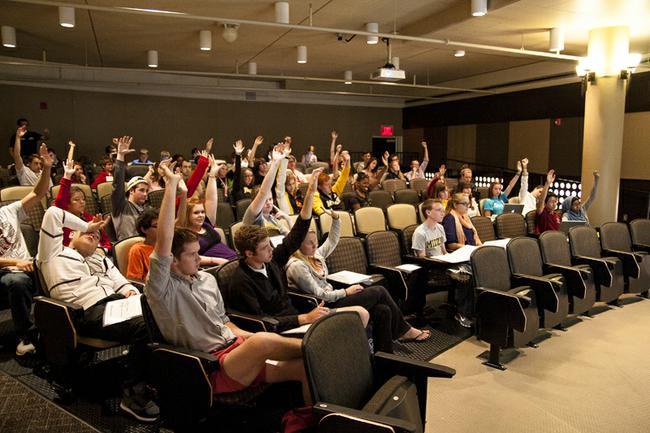
The Residence Halls Association Congress met for the first time Monday night and discussed its budget for the fall semester as well as the organization’s procedure for approving funding requests.
RHA Financial Coordinator Matt Kalish presented a budget proposal for the fall semester that the 44 present members of the Congress unanimously approved. The approved budget lays out allocations for the $36,166 RHA has available to spend this year, an increase of nearly $9,000 from last semester.
This increase is a result of changes to the way residence halls’ social fees are disbursed to give RHA a greater share of these fees in comparison to hall and floor governments. It allowed RHA to allocate an additional $4,750 to the programming section of its budget. RHA’s newly formed programming board will manage these funds.
“We think it is important to give a large share of the extra money we have received this year to the programming board because they are the ones who will be really doing a lot of the real work of RHA,” Kalish said during his presentation to Congress. “(The programming board’s job is) to go out and make life in the halls better by planning events that students want to go to and will benefit from.”
A significant share of the additional funds was also budgeted for the legislative distribution fund, which makes funds available to students and organizations who can request them to plan and host events for hall residents.
The rest of the budget went unchanged from last semester, with some sections receiving small increases in funding in order to cover inflation and other cost increases. The sustainability portion of budget was increased by $200. These funds will be used toward sustainability initiatives like drying racks in the residence halls as well as MU’s campus bike share program.
A large share of the remaining RHA funds was budgeted toward “non-standard line items,” which RHA is required to fund each semester. These items include housing fee waivers for the RHA president and vice president and a 1 percent budget allocation to MU’s chapter of National Residence Hall Honorary, RHA’s service-based sister organization. The approved budget also included $500 RHA must allocate each semester to cover the costs of its presidential elections.
The RHA Congress also decided funding requests more than $500 must be approved by the entire congress. Below this threshold, funding requests must only be approved by the RHA Operations Committee. RHA decided a $500 limit is necessary to provide greater oversight in making decisions about large funding requests.
“$500 is a good number because it will allow Congress to work efficiently so we are not quarreling over small funding requests and can make good use of our time,” Operations Committee Chairman Chris Connor said. “The members of the Operations Committee are fully committed, and I am confident they will do a good job, so I don’t think there is a need for a limit lower than $500.”
RHA President Zack Folk said he was satisfied with what the organization was able to get done during its first meeting.
“It was good,” Folk said. “I was happy we were able to pass the budget and decide on a limit for funding requests. I am looking forward to the rest of the year.”